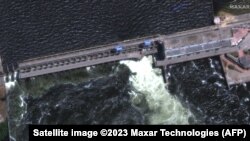The partial destruction Tuesday of the major Russian-held Kakhova dam near Kherson in southern Ukraine unleashed a torrent of water that sent people fleeing flooding on the war's front line.
People in Kherson were heading for higher ground as the water levels rose in the Dnipro River, which was held back by the dam and hydro powerplant.
"There is shooting, now there is flooding," said Lyudmyla, who had loaded a washing machine onto a cart that was attached to an old Soviet car.
"One hundred fifty tons of engine oil got into the Dnipro River due to the explosion," Daria Zarivna, communications adviser to the head of the Ukrainian president's office, said on social media.
Ukrainian President Volodymyr Zelenskyy said there was "a risk of further leakage of more than 300 tons."
Vladimir Leontyev, the Russian-installed mayor of the town of Nova Kakhovka where the dam is located, said residents of "around 300 homes" had been evacuated.
On the Russian-occupied side of the Kherson region, officials said there was "no threat" of major population centers being flooded, but said that more than 22,000 people were at risk.
The Kakhovka dam and its hydro-powerplant were seized by Russia in the first hours of the war.
Ukrainian President Volodymyr Zelenskyy convened a meeting of his National Security Council over what he called a "terrorist attack".
Western powers also blamed Russia for the damage to the Kakhovka dam, with E.U. chief Charles Michel calling it a "war crime."
NATO chief Jens Stoltenberg said the dam breach was "outrageous" and "puts thousands of civilians at risk and causes severe environmental damage."
Russia however said the dam was partially destroyed by "multiple strikes" coming from Ukrainian forces.
Kremlin spokesman Dmitry Peskov said the destruction was the result of a "deliberate sabotage by the Ukrainian side."
The Soviet-era dam sits on the Dnipro river, which provides cooling water for the Russian-occupied Zaporizhzhia nuclear power plant.
The flooding fueled already existing fears for the safety of the Zaporizhzhia plant, under Russian control.
The plant is some 150 kilometers away from the damaged dam.
The U.N.'s International Atomic Energy Agency (IAEA) said its experts "are closely monitoring the situation" but that there was "no immediate nuclear safety risk at plant."
The Russian-installed director of the plant, Yuri Chernichuk, echoed the U.N. agency and said that "at the moment, there is no security threat to the Zaporizhzhia nuclear power plant."
News of the damage came amid increasing speculations over Ukraine's long-expected counter-offensive.
Ukraine has for days called for silence ahead of its counteroffensive and said there would be no announcement about when it would start.
On Monday, Zelenskyy praised his troops for advances claimed near the devastated city of Bakhmut, while Russia said it had repelled a large-scale attack.
Ukraine said that Russia's goal was to "create obstacles" for Kyiv's long-awaited counteroffensive to retake territory from Moscow's forces.
Kyiv already accused Moscow of mining the dam as combat raged nearby in October, during the last major offensive by Ukrainian forces seeking to regain lost territory, which Russia denies.
Built in Soviet times in the 1950s, the Kakhovka dam has strategic value as it pumps water into the North Crimean Canal, which starts in southern Ukraine and crosses the entire Crimean peninsula.
This means that any problem with the dam could cause water supply problems for Crimea, which has been under Russian control since 2014.
And Kyiv has vowed to take back Crimea.

Forum